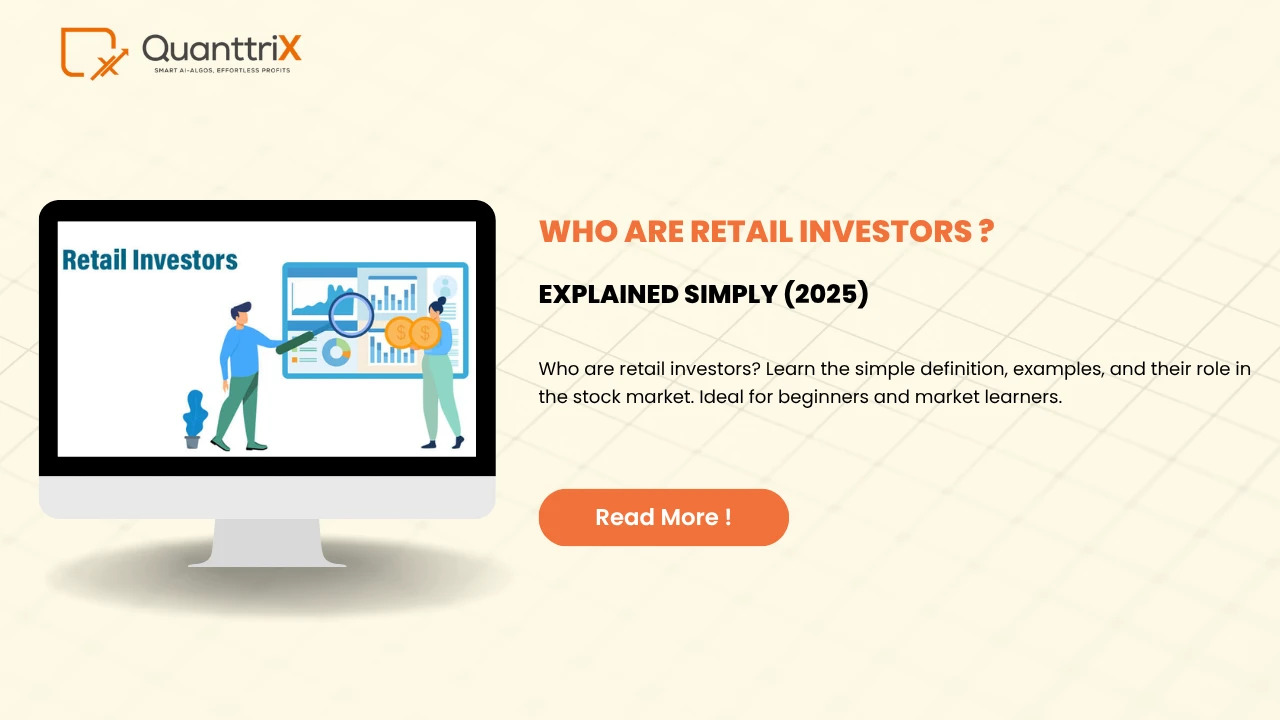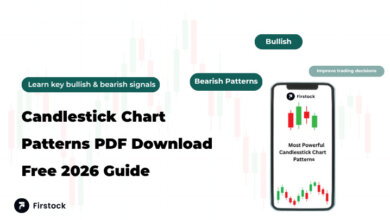Who Are Retail Investors? A Complete Guide in Simple Words
Learn who are retail investors, how they invest, and explore algorithmic trading software price, automated trading software, and auto trading software options.

Who Are Retail Investors? A Beginner’s Guide to Smart Investing
Have you ever bought a few shares using your phone or laptop? If yes, then guess what—you’re a retail investor. But what does that really mean? In today’s world, investing isn’t just for big banks or billionaires. Thanks to technology, anyone can enter the stock market with a few taps.
In this article, we’ll break down everything about who are retail investors, how they operate, and how automated trading software like auto trading software is changing the game. We’ll use simple, conversational language—because money talk shouldn’t be rocket science.
Learn who are retail investors, how they invest, and explore algorithmic trading software price, automated trading software, and auto trading software options.
Introduction to Retail Investors
So, who are retail investors?
Retail investors are everyday people like you and me who invest our personal money in stocks, mutual funds, bonds, or ETFs. We’re not professionals working for large institutions. We’re individual investors, usually buying and selling through brokerage platforms.
Think of it like grocery shopping. Big institutional investors buy in bulk—truckloads of apples. Retail investors? We buy a few apples for our family. Same market, different scale.
Retail vs. Institutional Investors
Let’s break this down simply.
| Feature | Retail Investors | Institutional Investors |
| Who? | Individuals | Companies, Banks, Hedge Funds |
| Funds | Limited | Huge Capital |
| Tools | Basic to Advanced | High-End Tools & Research |
| Speed | Slower | Faster due to tech & staff |
While institutional investors may have more resources, retail investors have the power of speedy platforms, flexibility, and low entry points. Plus, we make up a huge portion of market activity today.
How Do Retail Investors Invest?
Retail investors use apps, brokers, and online portals to:
- Buy and sell shares
- Invest in mutual funds or SIPs
- Purchase gold, ETFs, or even cryptocurrencies
They often follow market news, take tips from experts, or use automated tools. Some invest monthly (like an SIP), others jump in during market highs or lows.
The Rise of Technology in Retail Investing
In the past, investing meant calling a broker and filling forms. Now? It’s as simple as ordering food online.
Thanks to automation, AI, and data analytics, retail investors have access to:
- Real-time market data
- Trading bots
- Auto trading software
- Educational tools
The game has changed—and it’s more exciting than ever!
What Is Automated Trading Software?
Automated trading software is like your personal robot trader. It buys and sells stocks for you based on certain rules you set or select.
You don’t have to monitor the screen 24/7. The software watches the market, reacts to price changes, and executes trades automatically.
This is also called algorithmic trading, where algorithms (formulas) make trading decisions faster than humans ever could.
Understanding Auto Trading Software
Let’s go deeper.
Auto trading software does the following:
- Monitors multiple stocks
- Executes trades without emotional bias
- Sends alerts for market moves
- Allows backtesting strategies before using real money
It’s like setting up a self-driving car in the stock market. You map the route, and it takes you there—no hands on the wheel.
What Is the Algorithmic Trading Software Price Like?
Ah, the big question: What’s the cost of these tools?
The algorithmic trading software price depends on factors like:
- Features (AI, speed, customizations)
- Real-time data feed access
- Support & updates
- Broker integration
Some tools start at just ₹1,000/month, while premium platforms can go up to ₹20,000+ or more. Open-source tools may be free, but require coding knowledge.
Popular tools include:
- Zerodha Streak
- Tradetron
- Quanttrix
- AlgoTest
The key? Choose what matches your style and budget.
Why Retail Investors Use Trading Software
Let’s be real. Monitoring markets all day isn’t everyone’s dream.
Here’s why people love automated trading software:
- Saves time – no need to sit in front of charts
- Avoids emotional decisions – no panic selling!
- Backtesting options – test before you invest
- Scalability – manage multiple strategies at once
It’s ideal for side hustlers, part-timers, or full-time investors who want consistency.
Benefits of Automated Trading
Here’s a quick list of the pros:
- Speed: Trades happen in milliseconds
- Discipline: Follows rules, not emotions
- Diversification: Handles many trades at once
- Efficiency: More trades with less manual effort
Remember, automation doesn’t mean profit is guaranteed. But it gives you a stronger edge in the market.
Risks Every Retail Investor Should Know
Of course, every rose has its thorns.
Risks of automated trading:
- Technical errors (internet loss, software bugs)
- Wrong settings can lead to big losses
- Market volatility might override algorithms
- Over-reliance can reduce learning and judgment
Pro tip: Always test your strategy first with a demo account or paper trading.
Retail Investors in India: A Growing Tribe
In India, the number of retail investors has skyrocketed in recent years. Thanks to apps like Zerodha, Upstox, Groww, and Paytm Money, opening a Demat account is faster than ordering pizza.
Stats to consider:
- Over 15 crore Demat accounts in 2025
- Massive growth in Tier 2 and Tier 3 cities
- Surge in youth participation (18–35 years)
Retail investing is no longer an “elite activity.” It’s for everyone with a smartphone and curiosity.
Tips for Beginner Retail Investors
New to investing? Here’s how to start smart:
- Start small: Don’t invest money you can’t afford to lose
- Learn first: Watch YouTube videos, take online courses
- Use demo accounts: Practice without risk
- Follow a plan: Avoid chasing trends blindly
- Stay consistent: SIPs can help you stay disciplined
Remember: The market rewards patience more than luck.
How to Choose the Right Trading Software
Too many options? Here’s how to decide:
| Feature | What to Look For |
| Interface | Easy to use for beginners |
| Pricing | Check if it fits your budget |
| Strategy Builder | Drag-and-drop or coding? |
| Support | Good customer help & tutorials |
| Broker Compatibility | Works with your Demat account? |
Try free trials or demo versions before buying.
Future of Retail Investing with AI and Automation
The future is bright—and fast.
We’re heading into an era where:
- AI predicts market movements
- Bots adjust portfolios in real-time
- Voice assistants guide investments
- Hyper-personalized strategies are built for you
Retail investors will soon have institutional-grade power in their pocket.
Final Thoughts: Is Retail Investing for You?
If you’ve ever saved money, wondered how stocks work, or dreamed of growing your wealth—retail investing is for you.
You don’t need to be a math wizard or a market guru. With the right tools, a learning mindset, and discipline, you can be part of a financial revolution.
Start small. Learn lots. Grow slow—but grow strong.
FAQs
1. Who are retail investors?
Retail investors are individual people who invest their own money in the stock market, usually through online brokers or trading platforms.
2. Is automated trading software good for beginners?
Yes, if used wisely. Many platforms offer beginner-friendly interfaces, but it’s best to start with demo accounts first.
3. How much does algorithmic trading software cost?
The algorithmic trading software price ranges from free (open-source) to ₹1,000–₹20,000+ per month, depending on features and support.
4. Can retail investors use auto trading software in India?
Absolutely! Many Indian platforms like Streak, Quanttrix, and Tradetron cater specifically to retail traders with automated tools.
5. What are the risks of using automated trading software?
Key risks include wrong configurations, over-reliance on automation, internet issues, and sudden market volatility affecting strategy performance.




